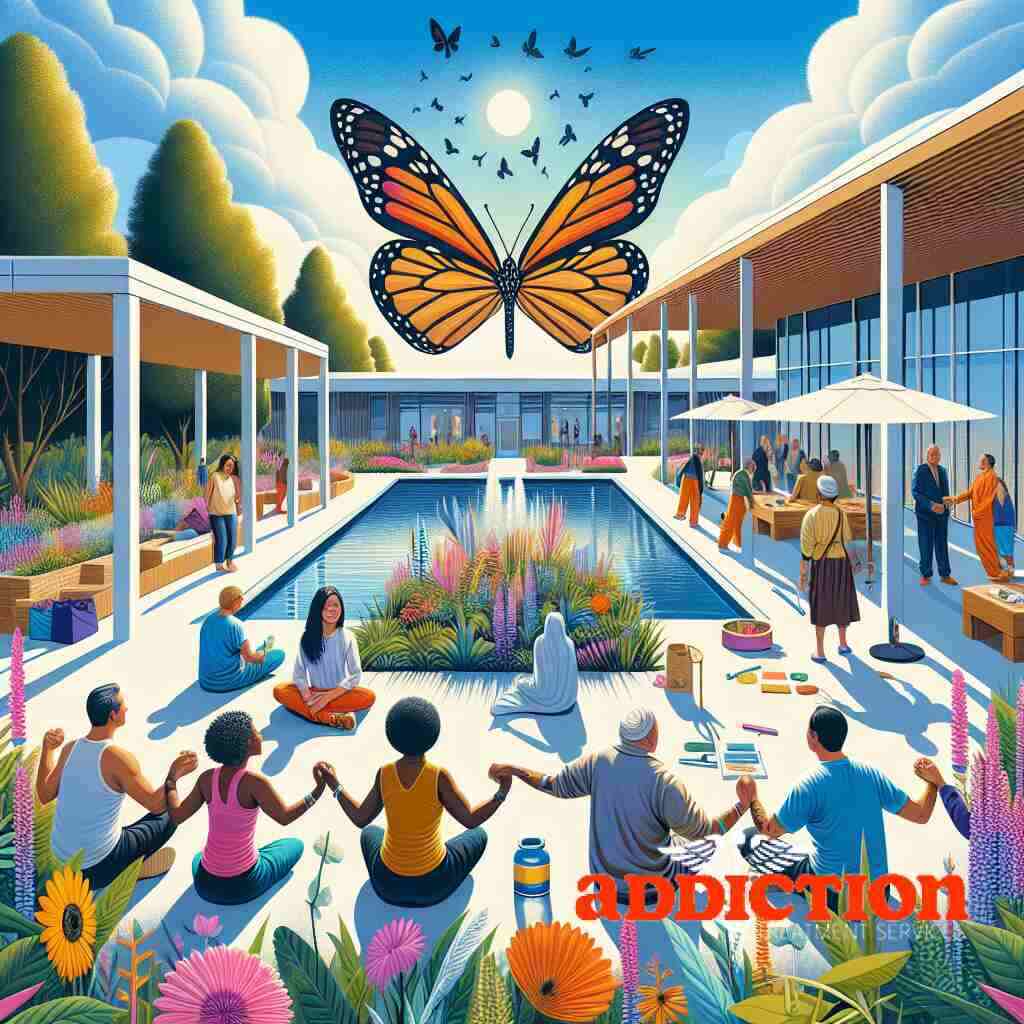 Posted On: 06/05/2025
Posted On: 06/05/2025Unveiling the Future of Sober Living in New Jersey
Understanding the Need for Innovation in Recovery Housing
The ever-evolving landscape of addiction recovery necessitates groundbreaking approaches to effectively meet the complex needs of individuals striving for sobriety. In New Jersey, Innovative sober living approaches are paramount to fostering sustainable recovery environments. With traditional methods often falling short, new strategies are revolutionizing recovery housing, bridging the gap between detoxification and long-term sobriety. The incorporation of personalized plans ensures each individual’s pathway to recovery is tailored, enhancing their chances for success.
Evaluating the Impact of New Jersey’s Recovery Environment
New Jersey’s vibrant network of recovery supports paves the way for advanced recovery housing solutions. The state has long been at the forefront of integrating behavioral health services into sober living frameworks. By assessing the current infrastructure, we see how community-focused and evidence-based methods have positively reshaped sobering environments. These strategies not only provide secure spaces for recovery but also establish enduring support systems, critical for individuals rebounding from substance misuse disorders. This emphasis on comprehensive rehabilitation channels a path towards lasting sobriety.
The Evolution of Sober Living Resources in NJ
Over the years, New Jersey has witnessed a transformative shift in the resources available for sober living. This evolution is epitomized through the emergence of therapeutic and holistic sobriety recovery methods, designed to address both the physiological and psychological aspects of addiction. Utilizing inclusive models that balance physical health and mental wellness, New Jersey’s sober living resources have set a nationwide standard. These pioneering methods dovetail with community-supported frameworks, ensuring robust pathways for those embarking on their recovery journeys.
1 – Personalized Recovery-Focused Living Spaces
Tailored Support for Individual Sober Living Needs
Creating a recovery-focused environment requires personalized addiction care strategies, which emphasize individual support mechanisms. These strategies boost the effectiveness of addiction treatment services by aligning therapies with each individual’s unique recovery requirements. Emphasizing the personalization of recovery housing solutions allows these interventions to address personal challenges associated with substance misuse. By tailoring sober living environments, New Jersey continues to foster adaptive recovery pathways that cater to the specific needs of residents, enhancing the prospects of a sustainable recovery.
Incorporating Mental Health Services into Recovery Homes
Integrating holistic mental health services within recovery homes elevates the standard of care available to residents. This integration ensures that mental health issues, often accompanying substance abuse, are addressed comprehensively. Recovery housing in New Jersey now routinely incorporates these services, offering robust, therapeutic techniques designed to tackle both the psychological and physiological impacts of addiction. By acknowledging the significance of mental health in the recovery process, these homes create a balanced therapeutic environment that promotes long-term sobriety.
Sustainable Sober Living Strategies for Personalized Growth
Implementing sustainable sober living strategies plays a pivotal role in ensuring ongoing recovery success. These strategies prioritize adaptability and evolution, accommodating the progress of each individual. By focusing on growth, residents are empowered to build resilient recovery pathways. New Jersey’s forward-thinking approaches in sober living not only support current rehabilitation strategies but also prepare individuals for future challenges, embedding perseverance in their recovery journey. Exploring advanced recovery housing solutions further solidifies these strategies, emphasizing personalization and long-term recovery growth as foundational elements of effective sober living.
2 – Community-Focused Sober Living: A New Paradigm
Creating Dynamic Recovery Environments
In New Jersey, community-focused sober living is redefining recovery housing by fostering dynamic environments conducive to healing and growth. These environments prioritize collaboration and community engagement, vital components in the journey to sobriety. By integrating supportive recovery environments in New Jersey, sober living residences are able to offer a more cohesive and nurturing atmosphere. Residents are encouraged to actively participate in various community activities and initiatives, bolstering their sense of belonging. This active engagement not only aids in reducing the isolation often associated with addiction recovery but also enhances the overall therapeutic experience.
Dynamic environments thrive on the synergy between residents and their communities, presenting opportunities for personal development. These settings often feature communal living spaces where individuals can share experiences and support each other, which is pivotal in fostering mutual understanding and empathy. The presence of structured schedules incorporating communal activities helps instill discipline, an essential trait for sustained sobriety. This approach is a marked departure from conventional individualized recovery methods, ushering in a new era of shared responsibility and collective healing.
Peer Support in New Jersey’s Sober Housing Communities
Peer support has emerged as a cornerstone of New Jersey’s innovative sober living approaches, transforming how recovery communities operate. By emphasizing the importance of shared experiences, these communities create strong bonds among residents, enhancing their recovery journeys. Peer support groups facilitate open discussions, providing a platform for individuals to express their challenges and victories. This camaraderie becomes an invaluable resource, promoting resilience and reducing the likelihood of relapse.
Importantly, many of New Jersey’s sober housing communities host regular Alcoholics Anonymous meetings and support and other peer-led groups, ensuring continuous access to guidance and motivation. The collaborative nature of peer support empowers residents to take collective strides toward achieving sobriety, encouraging accountability and fostering a supportive atmosphere. These communities often witness transformative changes in their members as peer support bridges the gap between understanding and action, making sobriety more achievable.
Building a Foundation for Long-Term Sobriety
To ensure long-term sobriety, New Jersey’s community-focused sober living models emphasize building a solid foundation through integrated support systems. This involves a comprehensive approach that combines educational programs, vocational training, and life skills workshops aimed at equipping residents with the tools necessary for sustainable recovery. These initiatives are designed to address the various dimensions of recovery, including emotional, social, and professional aspects, thereby creating a holistic recovery framework.
Moreover, by leveraging therapeutic techniques for sober living, these communities offer a spectrum of therapeutic modalities tailored to enhance personal growth and self-efficacy. Programs are adaptable, evolving to match the changing needs of residents, and covering essential topics like coping strategies and stress management. With these robust support systems in place, individuals are better prepared to navigate the challenges of reintegration into society, significantly improving their chances of maintaining sobriety in the long term.
Such comprehensive care doesn’t merely focus on preventing relapse but encouraging residents to lead fulfilling, independent lives. This commitment to fostering resilient recovery pathways makes community-focused sober living a promising model for sustainable addiction recovery in New Jersey.

3 – Emotionally Resilient and Evidence-Based Sober Homes
Integrating Behavioral Health with Sober Living
To enhance the efficacy of sober living in New Jersey, integrating behavioral health services is pivotal. These emotionally resilient environments are designed to address the complex interplay between addiction and mental health, providing comprehensive care that acknowledges the multifaceted nature of recovery. By seamlessly incorporating behavioral health services into sober living facilities, New Jersey fosters a setting where residents can engage with therapeutic practices crucial for long-term sobriety.
Collaboration between therapists and addiction specialists ensures that residents receive nuanced support tailored to their unique struggles. Programs that focus on emotional regulation and psychological resilience help establish a strong foundation for recovery. By embedding dual diagnosis approaches in sobriety into the framework of sober homes, these facilities offer a holistic healing paradigm that goes beyond surface-level treatment. This integration marks a significant shift in how addiction recovery is approached, highlighting the importance of addressing mental health alongside substance use disorders.
Innovative Techniques in Relapse Prevention
Relapse prevention is a core component of effective sober living, and New Jersey’s evidence-based homes are pioneering innovative strategies to tackle it. These homes adopt a proactive stance, employing techniques aimed at identifying potential triggers and reinforcing coping mechanisms before a relapse occurs. By leveraging effective strategies for relapse prevention, these facilities equip residents with the tools needed to navigate the complexities of addiction recovery.
New Jersey sober homes often implement structured daily routines and incorporate ongoing education about signs of withdrawal symptoms. This proactive education helps residents understand their physiological and psychological responses to stressors, enabling them to make informed decisions about their recovery journey. Additionally, cognitive-behavioral therapy and mindfulness-based interventions are utilized to enhance self-awareness and emotional intelligence, key factors in sustaining sobriety. By focusing on prevention, these homes encourage a culture of vigilance and adaptability, crucial for long-term success.
Fostering Resiliency Through Evidence-Based Practices
At the core of New Jersey’s emotionally resilient sober homes is a commitment to evidence-based recovery practices. These homes employ scientifically validated methods to cultivate an environment where personal growth and lasting recovery are paramount. Techniques such as motivational interviewing and strengths-based approaches are fundamental in empowering residents to harness their inner resilience and drive transformative change.
By grounding their practices in empirical research, sober homes ensure that interventions are not only effective but also adaptable to the individual needs of residents. Programs often include a blend of traditional therapeutic models and innovative recovery support strategies in NJ. This dual approach allows for flexibility in care planning, ensuring each resident receives personalized attention that aligns with their recovery goals. Dive into The Ultimate Guide to Integrative Care Solutions. The emphasis on evidence-based practices positions New Jersey at the forefront of cutting-edge recovery housing, offering a blueprint for sustainable sobriety pathways.
4 – Holistic and Therapeutic Approaches to Sober Living
Understanding Holistic Sober Living Strategies
In New Jersey, embracing holistic sobriety recovery methods has become a cornerstone of innovative addiction treatment services. These strategies recognize the importance of treating the whole person rather than focusing solely on substance misuse. By integrating approaches that cater to physical, emotional, and spiritual well-being, individuals are better equipped to handle the complexities of recovery. Holistic strategies often incorporate mindfulness practices, nutritional support, and alternative therapies like yoga and meditation, which collectively foster a balanced recovery.
New Jersey’s emphasis on holistic methods is reshaping recovery dynamics, offering residents environments that nurture comprehensive healing. This approach is pivotal because it acknowledges that overcoming addiction involves more than just abstaining from substances; it requires lifestyle changes that promote overall wellness. As such, holistic sober living strategies are aligned with the goal of achieving a lasting, substance-free lifestyle in NJ, providing a foundation for sustainable personal transformation.
Implementing Comprehensive Therapeutic Models
Therapeutic models in New Jersey’s sober living facilities are expanding to embrace more comprehensive approaches, offering tailored treatment programs that address diverse recovery needs. These models are characterized by customized interventions that integrate mental, emotional, and social therapies, harmoniously weaving together multiple modalities to support recovery.
Facilities often combine traditional therapy methods with innovative practices to create adaptable treatment plans. This synthesis helps cater to the individual experiences of each resident, allowing for personalized healing trajectories. Group therapy sessions, one-on-one counseling, and skill-building workshops come together to construct a multi-faceted recovery plan that empowers individuals. By prioritizing therapeutic models that evolve with residents’ progress, New Jersey continues to lead in creating transformative paths to sobriety.
Balancing Body, Mind, and Spirit in Recovery
Achieving harmony between body, mind, and spirit is a fundamental goal of behavioral health services in New Jersey’s sober homes. This balance is critical in facilitating complete recovery and preventing relapse. Sober living facilities in New Jersey emphasize this integration by providing environments where individuals can cultivate physical health through fitness programs and nutritional guidance.
Mental well-being is meticulously addressed through behavioral therapies and holistic mental health services. Simultaneously, spiritual growth is encouraged, often through meditation practices and community support, all aimed at fostering a deeper sense of purpose and connection. By creating a recovery framework that honors the interplay between these elements, sober living facilities in New Jersey empower individuals to pursue a comprehensive and enduring path to wellness, fully prepared to face the challenges of maintaining sobriety. Through this meticulous approach, New Jersey remains at the forefront of pioneering recovery solutions, solidifying its reputation as a leader in innovative sober living solutions near you.
5 – The Future of Modern Sober Living Facilities
Redefining Sober Living with Cutting-Edge Innovations
New Jersey is at the forefront of redefining sober living by integrating cutting-edge innovations in their facilities. These advancements are setting a new standard in the realm of addiction treatment, emphasizing the creation of environments that foster sustainable recovery. By implementing state-of-the-art technologies and evidence-based strategies, modern sober houses are elevating the quality of care available to residents. This approach not only enhances the therapeutic experience but also supports the development of more resilient recovery pathways.
Incorporating digital platforms for daily therapeutic sessions and virtual support networks allows for seamless communication between residents and healthcare providers. These digital tools facilitate ongoing engagement, ensuring individuals remain connected to vital support systems. Additionally, the introduction of advanced biometric monitoring provides real-time insights into resident health, paving the way for proactive interventions. This convergence of technology and recovery underscores the capabilities of future-focused sober living facilities.
Modern Amenities and Resources in NJ Sober Houses
New Jersey’s sober houses are increasingly equipped with modern amenities and resources designed to promote a holistic recovery experience. From state-of-the-art fitness centers to tranquil meditation spaces, these facilities are built to cater to a variety of wellness needs. The inclusion of comprehensive on-site resources allows residents to engage in a well-rounded recovery journey that addresses physical, mental, and emotional well-being.
Facilities offer programs that encompass nutritional support and physical fitness, essential components of a holistic recovery approach. By providing residents with access to balanced meal plans and personalized fitness regimens, sober houses ensure the promotion of a healthy lifestyle. The integration of recreational activities and communal spaces further supports social engagement, fostering a sense of community and belonging among residents. These modern resources position New Jersey’s sober living facilities as leaders in comprehensive addiction recovery.
Futuristic Approaches to Sustainable Recovery
Focusing on sustainable recovery, New Jersey’s sober living facilities are embracing futuristic approaches that anticipate and respond to the evolving needs of their residents. The development of personalized sober living plans is central to this initiative, emphasizing adaptable care models that grow with the individual. By utilizing advanced technologies such as AI-driven analytics and virtual reality simulations, residents gain immersive insights into their recovery process.
These innovations encourage individuals to actively participate in their recovery, providing tools that enable self-assessment and empowerment. Programs are designed to educate residents on recognizing signs of withdrawal symptoms, teaching proactive coping mechanisms that mitigate the risk of relapse. Through continuous refinement of therapeutic methodologies and integration of future-oriented technologies, New Jersey’s sober houses exemplify the evolution of sustainable recovery. This commitment to forward-thinking approaches ensures that recovery is not just a goal but a lasting reality for those in their care.

Conclusion: Transformative Paths to Sober Living Success in NJ
Assessing the Impact of Innovative Sober Strategies
In New Jersey, innovative sober strategies have substantially reshaped the landscape of recovery housing, setting a remarkable precedent nationwide. These new methodologies have not only broadened the spectrum of recovery paths but have also enhanced the sustainability of sober living. The shift from traditional approaches to dynamic solutions underscores New Jersey’s commitment to advancing the effectiveness of recovery environments. Recovery support strategies in NJ effectively address the comprehensive needs of individuals, ensuring a safer transition into sobriety.
As we assess the macro impacts of these strategies, the synergy between community involvement and personalized care stands out prominently. These innovations have not only improved retention rates within the programs but have also reinforced the infrastructure supporting long-term recovery. The resultant positive social and psychological outcomes showcase the necessity of continuing to harness these progressive approaches, ensuring that recovery success is not just attainable but sustainable.
Charting Future Directions for Sober Living in New Jersey
The future of sober living in New Jersey promises an even deeper integration of technology and holistic practices. As facilities continue to evolve, the utilization of data-driven insights will be pivotal in crafting individualized care plans that are proactive and preventative. Future strategies will likely focus on expanding digital connectivity, enabling real-time support and continuous adaptation of recovery pathways.
Moreover, the emphasis will likely shift towards more immersive recovery experiences, blending cutting-edge technology with compassionate care. As facilities enhance their services, the incorporation of innovative metrics for tracking progress will be instrumental. By anticipating these developments, New Jersey positions itself as a leader in revolutionary recovery, paving the way for transformative healing and groundbreaking sober living solutions.
Embracing a Substance-Free Lifestyle for Lasting Change
Achieving a substance-free lifestyle in New Jersey extends beyond mere abstinence-it embodies a comprehensive commitment to transformation and growth. The advanced sober living strategies employed have created foundations for lasting change, encouraging residents to engage in proactive life planning and personal development. By fostering environments that promote physical, mental, and emotional wellness, these facilities ensure that sobriety is not perceived merely as a goal but as a viable, fulfilling lifestyle.
To fully embrace this transformation, integrating extensive education on drug detoxification processes into recovery programs enhances awareness and understanding among individuals. This knowledge empowers residents to maintain vigilance against relapse while identifying essential lifestyle adjustments needed for sustained sobriety. As New Jersey continues to champion these pioneering efforts, it emboldens each individual’s journey towards leading dynamic lives free from substance misuse, illuminating a hopeful horizon for recovery nationwide.
Frequently Asked Questions
Question: What are the key advantages of incorporating personalized sober living plans in recovery housing in New Jersey?
Answer: Personalized sober living plans offer many advantages for individuals seeking recovery in New Jersey. By tailoring recovery-focused living spaces to suit the unique needs of each resident, these plans enhance the efficacy of addiction treatment services. Personalization ensures that therapeutic interventions address the specific physical, mental, and emotional challenges of substance misuse, thus fostering more sustainable recovery outcomes. With addiction recovery NJ prioritizing individualized care, residents can develop resilient pathways to long-term sobriety, fully supported by addiction treatment services designed to meet diverse needs.
Question: How does Addiction Treatment Services support community-focused sober living NJ initiatives that foster dynamic recovery environments?
Answer: Addiction Treatment Services supports community-focused sober living NJ initiatives by providing a comprehensive directory of addiction treatment services that prioritize community engagement and peer support. We recognize the importance of dynamic recovery environments in promoting a sense of belonging and mutual understanding among residents. Consequently, our resources include access to innovative sober living facilities that integrate community activities and collaborative support systems. These environments are essential for reducing isolation and fostering collective healing, thereby ensuring a robust support network that enhances addiction recovery NJ outcomes.
Question: How are holistic sober living strategies implemented in New Jersey’s sober housing to ensure a comprehensive approach to recovery?
Answer: In New Jersey, holistic sober living NJ strategies are implemented by integrating therapies that address the body, mind, and spirit. Addiction Treatment Services provides access to facilities that incorporate mindfulness practices, nutritional support, and alternative therapies such as yoga and meditation. This comprehensive approach recognizes the complexity of substance use disorders and emphasizes treating the whole person, rather than solely focusing on substance misuse. By promoting overall wellness and balance, these strategies support a substance-free lifestyle NJ approach that nurtures sustained recovery and personal transformation. Check out What Does Holistic Recovery Entail in 2025?
Question: What innovative techniques are employed in New Jersey’s evidence-based recovery homes to prevent relapse?
Answer: New Jersey’s evidence-based recovery homes employ innovative techniques such as cognitive-behavioral therapy and mindfulness-based interventions to prevent relapse. Addiction Treatment Services ensures that facilities utilize structured daily routines and educate residents about signs of withdrawal symptoms, enhancing their understanding of physiological and psychological responses to triggers. By proactively engaging residents with these strategies, recovery housing New Jersey empowers individuals with the tools necessary to navigate the complexities of addiction and maintain long-term sobriety.
Question: What role does technology play in the future of modern sober living facilities in New Jersey, as outlined in the blog title ‘Top 5 Innovative Approaches to Sober Living in New Jersey’?
Answer: Technology plays a pivotal role in shaping the future of modern sober living facilities in New Jersey. As highlighted in the blog title ‘Exploring the Rise of E-Therapy in Addiction Treatment,’ cutting-edge innovations such as digital platforms for virtual support networks and advanced biometric monitoring are redefining sober living. These technologies facilitate seamless communication between residents and healthcare providers, offering real-time insights into health metrics. By incorporating such advancements, modern sober living facilities enhance the quality of addiction recovery in NJ and provide personalized recovery strategies that evolve with each resident’s needs, ensuring a sustainable recovery journey.


